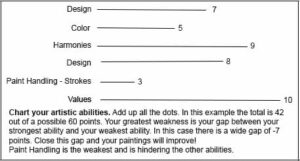Summary by Susan Blackwood OPA based on OPA 2013 National Exhibition presentation by Joe Paquet

Joe was our first speaker to kick off the fabulous weekend in Fredericksburg, Texas. His excellent, inspirational and powerful talk flew straight to the heart of the matter. It was a great way to start the 2013 OPA National Show and Convention.
“What is your goal as an artist?” This question was first presented to Joe by Don Demurs.
Joe has spent a lot of time thinking about this. Here is a brief summary of his thoughts and ideas and his reality of putting them into practice.
As artists, we make choices toward our goal or away from it. We want to be relevant and we want to be validated. Social Media seems to give us that — but does it? All that really matters is the last painting that you have painted.
Fact: we all may be artistic but are we all artists? It is all about our goal.
There are a lot of paintings “out there”. As an artist we need to only show paintings that edify and glorify ME, the artist….. then sell those paintings only. We need to bring something of worth to the world. We need to ask ourselves…. “Have I lost the connection and love in my paintings?”
Our lives are full of external pressure to produce. We are in a hurry. Are we missing the true path by not allowing our growth in our paintings to be organic and ripen on the vine. Fine Art is not really about the “packaging of our product” but about the growth of the artist. Life is a tightening spiral. With each choice one makes, the spiral of choices gets tighter and closer; Joe’s advice is to “know Yourself” and not your audience.
So, how does an artist be original with thousands of years of art history and artists that seem to have done it all?
First: Find out what skills you have and what skills you need to improve. Make a chart of the skills that you need to be proficient as a representational oil painter. On a scale of one to 10, how do your following skills stack up?
- Drawing
- Color
- Harmonies
- Design
- Brush strokes
- Values

Chart yourself adding up the dots. Your greatest weakness is the gap between the strongest and the weakest dot. (Unfortunately we identify ourselves with our strengths and not our weakness.) There are lots of good artists today. However, in today’s art market the good paintings don’t get noticed anymore, exceptional paintings do get noticed. Look at your weaknesses, embrace them, make them strong and become exceptional.
Second: Paint what you love. If you love to paint apples, then paint apples. Paint passionate paintings — not “workable” paintings. Feel a bold connection to your work. Feel alive when you are painting, not just putting in time. This is not the time to be clever in front of nature, be passionate. Be YOU.
When looking at a masterpiece, don’t be swept up in the Master painter’s gift of how to make a stroke or the harmonies of color. This is his gift. Find YOUR GIFTS.
Be visceral — smell the grass — and touch the core of the subject.
Third and most important: It is not about speed or concept. It is about being willing to take a risk. Don’t be afraid to make a mistake. Technique is like… whip cream on a cinder block… it’s still a cinder block. Don’t paint like others – see the world honestly and don’t be lured by the hook of a popular style. Become the IT guy or gal by not trying to be the IT artist.
Work on your skills. Surround your self with honest people. Show no fear. Paint often. Any canvas will be scary if you only paint once every two months.
Take time to study your subject. Be visceral — smell the grass — and touch the core of the subject. Creativity is natural to every human; use that basic instinct.
Maybe you get to paint for one hour a week in the basement after the kids are asleep. So do it with passion. Tell the world about what you love, with no apologies. Our own thoughts come back to us in majesty. Paint what you paint with passion.
“Trust thyself: every heart vibrates to that iron string.” This is generally stating that if you trust yourself, then you can truly be content in whatever you do or wherever you go. “What I must do, is all that concerns me, not what people think.” Emerson – Self Reliance
Pay attention to this!
Joe’s own journey
As he grew in his own direction and passion, his work became more specific to his personal passion. In his case, he discovered the more he painted his passion, it increasingly made it more impossible to make his galleries happy. Instead he realized that he needed a dealer to sell his work. Then he could paint what he loved. He started painting his passion: the old neighborhoods, industrial sites, etc. He painted with joy and love. The desire makes a difference and the single most beautiful reason that anyone should paint. Essentially, it’s a choice — one that requires courage and skill.
If you are painting landscapes, “Talk to the landscape” — Jack Larson
Be true to yourself, surround yourself with support that has your best agendas at heart. Your support system must understand your heart.
Likewise. Tell artists when you like their art. Don’t feel threatened or be afraid. Tell them and be graceful. Treat each other well. Everything that we do in our lives is important. EVERYTHING MATTERS. All negative thoughts count. Be honest about your art. Even Whistler became sullen one night, took a candle to his paintings and lamented, “I should have drawn more.”
Do you have unity in your work or is it all over the place? Is the growth of your paintings an organic path or is it sporadic growth?
Theme is irrelevant. Only paint that which brings you joy. Only show the world your best passionate paintings. Some paintings will be blessed and some will fall by the wayside. Always ask yourself, “how many of these paintings of mine should actually go out the studio door?”
Two years ago, Joe took this all to heart. He got off the treadmill and started only painting from his passion. He told us that sometimes, regardless of the passion, they don’t sell. That is when he needs his supportive people the most. Yes, he has hit deep holes and high pinnacles. We all do.
Put your vision out there, this is what is meaningful to people.
Put your vision out there, this is what is meaningful to people. Like music, paintings should have all manner of emotions but be easy on the “ears.” Speak the most profound intimate speech but with a common language. Uncommon beauty has the greatest growth and life.
Joe Paquet is a nationally recognized, award winning artist. He is a Signature Member of the Plein Air Painters of America, the Salmagundi Club and an Out-of-State Artist Member of the California Art Club. Click here for more information on Joe Paquet.
Thank you, Joe for an uplifting lecture. You inspired us all to grow. I know that I plan on reading the notes of your lecture often, so I will take them to heart!
Marsha Savage says
What an inspiring post, Susan… thank you for summarizing Joe’s comments into something so to the core of what we as artists need to be doing. I have shared this post on my Facebook page because I talk to artists all the time about just what this post brings to the forefront. And, I need to heed this advice more also! Thank you again. The Oil Painters blog is something every artist needs to read, no matter what medium they are using.
Brenda Howell says
Thank you so much Susan! I have thought about Joe’s stunning presentation many times since the OPA experience in Fredericksburg and wished I had taken more notes. He communicated so many important ideas. I will share on FB also.
Georgesse says
I enjoyed and appreciated all of the post accept for one positon, ” As an artist we need to only show paintings that edify and glorify ME, the artist….. then sell those paintings only. We need to bring something of worth to the world.” I believe that our role as artists is to build up and edify society. Whether we are artists that allow for catharsis by creating imagery that is challenging or whether we capture the elusive beauty that can only be represented through the paint brush of great painters, we are to glorify God and build up societies and civilization with our work. This is one of the tenets of beauty. I love to refer to the great philosophers, Plato and Socrates when I contemplate my purpose as an artist.
Rachel Pineda says
Very good response Georgesse. I could not have said it better myself. I think the problem with a lot of “art” that is out there is that it does only edify if one can really apply that word and glorify the “artist”.
Jean Perry says
Hi Joe, Nice article. It was good to see your smiling face when I opened the opa email
Jean P
Mark Hemleben says
wow joe !!! thanks… i met you once at a cat. show….many years ago…i knew your work was honest and true… it inspired me then and now